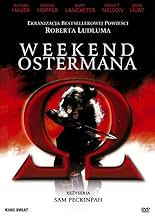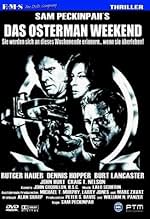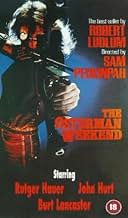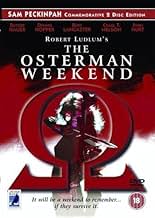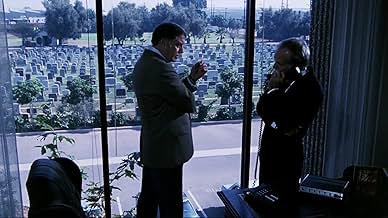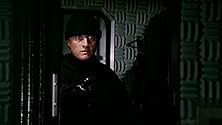AVALIAÇÃO DA IMDb
5,8/10
9,9 mil
SUA AVALIAÇÃO
Durante a Guerra Fria, um polêmico jornalista de televisão é convidado pela C. I. A. A persuadir certos conhecidos, que são agentes soviéticos a desertar da rede Omega.Durante a Guerra Fria, um polêmico jornalista de televisão é convidado pela C. I. A. A persuadir certos conhecidos, que são agentes soviéticos a desertar da rede Omega.Durante a Guerra Fria, um polêmico jornalista de televisão é convidado pela C. I. A. A persuadir certos conhecidos, que são agentes soviéticos a desertar da rede Omega.
- Direção
- Roteiristas
- Artistas
- Prêmios
- 2 vitórias no total
- Direção
- Roteiristas
- Elenco e equipe completos
- Produção, bilheteria e muito mais no IMDbPro
Avaliações em destaque
For all the poor reviews this film originally got, it isn't that bad. Sam Peckinpah's final film deals with the cold war, double agents, mind games, and how we watch such things every day through our television screens. And its often the perception of the camera that gives us our own. Even during the more confusing parts, the film is difficult to turn away from. The cast is exceptional, there is quite a bit of action, and you will sometimes feel the need to back up and re-watch some scenes. There were certainly worse films being made back in those days...
The central character is a television host played by the typically outstanding Rutger Hauer. One day he is summoned to a meeting with the CIA who instruct him that three of his best friends are really KGB agents and he must help expose them! That would be quite a thing to hear. Hauer is at first approached by John Hurt (who steals this movie), and then by the CIA director played by Burt Lancaster. Once Hauer agrees to expose his friends over the course of a weekend at his place, they inform him he never had a choice but to do so, anyway! Nice bunch of guys at the CIA. Hurt clearly has his own agenda, and it is one of revenge since Lancaster apparently once ordered Hurt's wife killed to protect their operations in Europe. And Hurt does not hesitate putting Hauer and his friends in jeopardy to achieve his goals. Are the friends KGB? I don't think we ever learn for sure if any are, but they do have left-leaning attitudes as well as things to hide. Honestly, by the end of this film it hardly even matters. The film concludes with both Hurt and Lancaster being exposed as crooked on Hauer's TV show, and Hauer attempting to rescue his wife and child from Hurt. Yes the plot is messy, but its based on a novel. Often times there are important things that need to be left out of a novel in order to have time to make it into a movie. That could be one explanation for the impenetrable plot details.
Peckinpah may have been near death, but this is still his film. You can tell with all the pretty women, slow motion action and gun play. Peckinpah claims the studio wanted him to re-cut it after a poor test audience reaction. But by this late stage in his life, it is unclear that he had the facilities to make this one a true winner. Give this film a try if you stumble across it. Or maybe just read the book. 6 0f 10 stars.
The Hound.
The central character is a television host played by the typically outstanding Rutger Hauer. One day he is summoned to a meeting with the CIA who instruct him that three of his best friends are really KGB agents and he must help expose them! That would be quite a thing to hear. Hauer is at first approached by John Hurt (who steals this movie), and then by the CIA director played by Burt Lancaster. Once Hauer agrees to expose his friends over the course of a weekend at his place, they inform him he never had a choice but to do so, anyway! Nice bunch of guys at the CIA. Hurt clearly has his own agenda, and it is one of revenge since Lancaster apparently once ordered Hurt's wife killed to protect their operations in Europe. And Hurt does not hesitate putting Hauer and his friends in jeopardy to achieve his goals. Are the friends KGB? I don't think we ever learn for sure if any are, but they do have left-leaning attitudes as well as things to hide. Honestly, by the end of this film it hardly even matters. The film concludes with both Hurt and Lancaster being exposed as crooked on Hauer's TV show, and Hauer attempting to rescue his wife and child from Hurt. Yes the plot is messy, but its based on a novel. Often times there are important things that need to be left out of a novel in order to have time to make it into a movie. That could be one explanation for the impenetrable plot details.
Peckinpah may have been near death, but this is still his film. You can tell with all the pretty women, slow motion action and gun play. Peckinpah claims the studio wanted him to re-cut it after a poor test audience reaction. But by this late stage in his life, it is unclear that he had the facilities to make this one a true winner. Give this film a try if you stumble across it. Or maybe just read the book. 6 0f 10 stars.
The Hound.
When this movie originally came out, five years after CONVOY (a muddled, but in many ways spectacular entertainment), many critics moaned that Peckinpah had yet again displayed his diminished talent. A Ludlum spy thriller, pulp material, given the Peckinpah stamp was not to be taken seriously, period. What nonsense. To begin with, all of Peckinpah's films spring from pulp, and all of them, even the least successful ones, buck and spin with the way Sam applies his vision to the genre conventions he's messing with.
In simple terms, a Peckinpah movie always illustrates the world according to Sam; like a novelist writing in first person, Sam's point of view is the movie's. And that's why they endure today. In THE OSTERMAN WEEKEND, Peckinpah focuses Ludlum's cold war spy antics into a exploration of urban paranoia and governmental abuse. Video as a means to manipulate perception is one of the themes he exploits here, but that's not his main thrust. A group of affluent characters come together for a weekend that turns into a surreal nightmare. The trappings of success that surround this group are not in any way secure enough to withstand the violent, reckless games played on them by a rouge CIA agent (played by John Hurt) who's motive is personal revenge. And that motive, the revenge that fuels his need, in actual fact, has absolutely nothing to do with the affluent group he's playing with. Like the gods in Greek tragedy, the Hurt character uses the Osterman Weekend and its players as pawns, stepping stones, as a way to get at his real goal, the head of the CIA. This notion obviously strikes a chord in Peckinpah; the vision is certainly domestic, but the idea is epic: in the privacy of our homes a kind of virus colors our perceptions and poisons friendships, creates anarchy, and causes death. And the virus - where does it come from? Our own back yard - the CIA.
The film is charged with a constant underlying tension that holds and holds until all hell breaks loose and the affluent house becomes a battle ground. Visually, the movie is stunning. But then, so was CONVOY, but this time Peckinpah has harnessed what he shows and what he wants to say in a simple, tightly wound spy thriller package, Watching the movie today, it's hard to believe that some of the notions that seemed more like the paranoiac mechanics of a potboiler in 1983 have actually come true and don't seem quite as far fetched. By all accounts, Sam Peckinpah was a terribly difficult man, but he was also a visionary film maker who's work gets better and better as the years pass. THE OSTERMAN WEEKEND is not the bad film critics at the time bitched about, and it's not the sad conclusion to a career that started out brimming with possibility. It's a splendid, brilliant - better than brilliant - work of American art by a true American artist: a giant. The world according to Sam is a world that will be looked at a hundred years from now; it will inspire debate, continual analysis, and be ranked with the major artist of the entire 20th century. By 1983,Peckinpah's health may have diminished, but as a film maker he was still powerful and strong as hell.
In simple terms, a Peckinpah movie always illustrates the world according to Sam; like a novelist writing in first person, Sam's point of view is the movie's. And that's why they endure today. In THE OSTERMAN WEEKEND, Peckinpah focuses Ludlum's cold war spy antics into a exploration of urban paranoia and governmental abuse. Video as a means to manipulate perception is one of the themes he exploits here, but that's not his main thrust. A group of affluent characters come together for a weekend that turns into a surreal nightmare. The trappings of success that surround this group are not in any way secure enough to withstand the violent, reckless games played on them by a rouge CIA agent (played by John Hurt) who's motive is personal revenge. And that motive, the revenge that fuels his need, in actual fact, has absolutely nothing to do with the affluent group he's playing with. Like the gods in Greek tragedy, the Hurt character uses the Osterman Weekend and its players as pawns, stepping stones, as a way to get at his real goal, the head of the CIA. This notion obviously strikes a chord in Peckinpah; the vision is certainly domestic, but the idea is epic: in the privacy of our homes a kind of virus colors our perceptions and poisons friendships, creates anarchy, and causes death. And the virus - where does it come from? Our own back yard - the CIA.
The film is charged with a constant underlying tension that holds and holds until all hell breaks loose and the affluent house becomes a battle ground. Visually, the movie is stunning. But then, so was CONVOY, but this time Peckinpah has harnessed what he shows and what he wants to say in a simple, tightly wound spy thriller package, Watching the movie today, it's hard to believe that some of the notions that seemed more like the paranoiac mechanics of a potboiler in 1983 have actually come true and don't seem quite as far fetched. By all accounts, Sam Peckinpah was a terribly difficult man, but he was also a visionary film maker who's work gets better and better as the years pass. THE OSTERMAN WEEKEND is not the bad film critics at the time bitched about, and it's not the sad conclusion to a career that started out brimming with possibility. It's a splendid, brilliant - better than brilliant - work of American art by a true American artist: a giant. The world according to Sam is a world that will be looked at a hundred years from now; it will inspire debate, continual analysis, and be ranked with the major artist of the entire 20th century. By 1983,Peckinpah's health may have diminished, but as a film maker he was still powerful and strong as hell.
John Tanner is a controversial journalist who makes it his business to hold truth to power on his television show, exposing government corruption wherever and whenever he can. As he is preparing for a weekend get together with three of his closest friends at his lavish California estate, Tanner is contacted by a CIA agent named Laurence Fassett. It transpires that Fassett and the agency believe Tanner's friends are part of a Soviet spy network, and they think he can get them to defect. As the weekend rolls on, suspicions become raised on all sides, and- as the lines between truth, fiction, loyalty and betrayal are irrevocably blurred- the question arises: just who is manipulating whom?
Directed by Sam Peckinpah and based on Robert Ludlum's novel of the same name, 'The Osterman Weekend' is a well-acted thriller that rises above its source material, though seems a sad swansong for such a visionary director. Screenwriters Ian Masters and Alan Sharp have injected some much-needed energy and cohesion into Ludlum's convoluted tale, transforming it into a parable about the power of television as a tool of propaganda, instead of the weak meditation on revenge and cold-war paranoia that it originally was.
Unlike in the book, Masters and Sharp use 'The Osterman Weekend' to explore how the media shapes narratives, changes meanings and influences opinions through editing and censorship. Through Tanner's program and the machinations of the CIA, they examine the idea that belief is generated through television- in other words, if people see it on TV, they believe it. While not a particularly profound or original notion, it lends the narrative more weight, as well as providing additional dramatic tension throughout.
This is not to say that 'The Osterman Weekend' should be lauded as a masterpiece, only that it asks more interesting questions than Ludlum's novel, and has a clearer message at its center. Masters and Sharp have not made Ludlum's awkward dialogue any more eloquent, nor has the inclusion of a new character and a new ending helped matters any. The story is still inherently flawed, and bad post-production and editing without Peckinpah's involvement means the finished product is a tad schizophrenic in terms of tone and content- though it is still inarguably easier to follow and more assured than its source material.
'The Osterman Weekend' reunites Peckinpah with cinematographer John Coquillon, whose talents the director had utilized for 'Pat Garrett & Billy the Kid' and 'Straw Dogs'. Coquillon does fine work that fits well within Peckinpah's oeuvre, featuring much of the director's trademark slow-motion violence. By incorporating CCTV footage from multiple monitors, Coquillon shows us different perspectives on events throughout, bolstering Tanner's paranoia and uncertainty about the reality of his situation. Odd angles and lighting are used to heighten this paranoia, though the overall visual aesthetic is one far less stylized than Peckinpah's 'The Wild Bunch', or Coquillon's work on 'Witchfinder General,' adding a sense of authenticity to proceedings.
Also contributing to the sense of paranoia and authenticity are the cast, many of whom deliver nuanced performances that keep audiences unsure of their motivations and loyalties. Rutger Hauer is charismatic and commanding as Tanner, showing a side of his personality he had not yet done through his villainous roles in Hollywood films. Craig T. Nelson does sterling work as Osterman, making him charming, yet morally mysterious. Dennis Hopper fades into the background somewhat, though has some good scenes with Helen Shaver, who is consistently excellent as his drugged-out wife, displaying much emotional perspicuity.
In his case, the great Burt Lancaster seems bored as the director of the CIA, apparently disliking Peckinpah's interpretation of the character and direction. For their parts, Chris Sarandon, Meg Foster and Cassie Yates are competent but generally underused. The real stand-out is John Hurt, who is spellbinding as Fassett, all but stealing the picture. Convincing, conniving and complex, Hurt transforms the one-note caricature of Ludlum's book into the most interesting character in the film, and it's a joy any time he's on screen.
Sam Peckinpah's last film, 'The Osterman Weekend' is far from his best work. Though it is well acted and features fine cinematography, the story leaves a lot to be desired, and post-production work without the involvement of the director leaves the finished product lacking consistency and coherence. Though its indictment of television as a mode of propaganda is still timely, it is not a particularly subtle or profound work in that regard. To conclude, though it has its moments, Bloody Sam deserved a better last hurrah than this.
Directed by Sam Peckinpah and based on Robert Ludlum's novel of the same name, 'The Osterman Weekend' is a well-acted thriller that rises above its source material, though seems a sad swansong for such a visionary director. Screenwriters Ian Masters and Alan Sharp have injected some much-needed energy and cohesion into Ludlum's convoluted tale, transforming it into a parable about the power of television as a tool of propaganda, instead of the weak meditation on revenge and cold-war paranoia that it originally was.
Unlike in the book, Masters and Sharp use 'The Osterman Weekend' to explore how the media shapes narratives, changes meanings and influences opinions through editing and censorship. Through Tanner's program and the machinations of the CIA, they examine the idea that belief is generated through television- in other words, if people see it on TV, they believe it. While not a particularly profound or original notion, it lends the narrative more weight, as well as providing additional dramatic tension throughout.
This is not to say that 'The Osterman Weekend' should be lauded as a masterpiece, only that it asks more interesting questions than Ludlum's novel, and has a clearer message at its center. Masters and Sharp have not made Ludlum's awkward dialogue any more eloquent, nor has the inclusion of a new character and a new ending helped matters any. The story is still inherently flawed, and bad post-production and editing without Peckinpah's involvement means the finished product is a tad schizophrenic in terms of tone and content- though it is still inarguably easier to follow and more assured than its source material.
'The Osterman Weekend' reunites Peckinpah with cinematographer John Coquillon, whose talents the director had utilized for 'Pat Garrett & Billy the Kid' and 'Straw Dogs'. Coquillon does fine work that fits well within Peckinpah's oeuvre, featuring much of the director's trademark slow-motion violence. By incorporating CCTV footage from multiple monitors, Coquillon shows us different perspectives on events throughout, bolstering Tanner's paranoia and uncertainty about the reality of his situation. Odd angles and lighting are used to heighten this paranoia, though the overall visual aesthetic is one far less stylized than Peckinpah's 'The Wild Bunch', or Coquillon's work on 'Witchfinder General,' adding a sense of authenticity to proceedings.
Also contributing to the sense of paranoia and authenticity are the cast, many of whom deliver nuanced performances that keep audiences unsure of their motivations and loyalties. Rutger Hauer is charismatic and commanding as Tanner, showing a side of his personality he had not yet done through his villainous roles in Hollywood films. Craig T. Nelson does sterling work as Osterman, making him charming, yet morally mysterious. Dennis Hopper fades into the background somewhat, though has some good scenes with Helen Shaver, who is consistently excellent as his drugged-out wife, displaying much emotional perspicuity.
In his case, the great Burt Lancaster seems bored as the director of the CIA, apparently disliking Peckinpah's interpretation of the character and direction. For their parts, Chris Sarandon, Meg Foster and Cassie Yates are competent but generally underused. The real stand-out is John Hurt, who is spellbinding as Fassett, all but stealing the picture. Convincing, conniving and complex, Hurt transforms the one-note caricature of Ludlum's book into the most interesting character in the film, and it's a joy any time he's on screen.
Sam Peckinpah's last film, 'The Osterman Weekend' is far from his best work. Though it is well acted and features fine cinematography, the story leaves a lot to be desired, and post-production work without the involvement of the director leaves the finished product lacking consistency and coherence. Though its indictment of television as a mode of propaganda is still timely, it is not a particularly subtle or profound work in that regard. To conclude, though it has its moments, Bloody Sam deserved a better last hurrah than this.
The Osterman Weekend (1983) was Sam Peckinpah's last film. Years of drug abuse (alcohol, pills etc..) took a devastating toll on the legendary film maker. Desperate for work, he took an uncredited second unit directing job with his buddy Don Siegal's swan song JINXED. He finally got the chance to direct a movie when he was given the job to try and adapt the complex and layered espionage spy thriller The Osterman Weekend. Not pleased with trying to bring to life a novel he really didn't care for, he did the job (albiet with mixed results).
Tanner (Rutger Hauer) is a talking head newsman. He has an eclectic group of friends (Chris Sarandon, Dennis Hopper and Crag T. Nelson). One day, Tanner is approached by a rogue C.I.A. named Fassett (John Hurt) agent to "keep an eye" on Osterman (Craig T, Nelson) because of his ties with certain "red" double agents. But Tanner knows Osterman and doesn't believe that he would be a traitor to his country. After a couple of attempts on his life, Tanner doesn't know who to trust. Is Osterman the traitor that Fassett claims to be? Who's telling the truth?
Not the way I wanted to see Sam Peckinpah end his career but hey, you play with the hand life deals you. People have complained about how confusing the movie is (have you read the book?). Considering with what he had to work with, I say that he did a fairly decent job.
Recommended for Sam Peckinpah fans.
Tanner (Rutger Hauer) is a talking head newsman. He has an eclectic group of friends (Chris Sarandon, Dennis Hopper and Crag T. Nelson). One day, Tanner is approached by a rogue C.I.A. named Fassett (John Hurt) agent to "keep an eye" on Osterman (Craig T, Nelson) because of his ties with certain "red" double agents. But Tanner knows Osterman and doesn't believe that he would be a traitor to his country. After a couple of attempts on his life, Tanner doesn't know who to trust. Is Osterman the traitor that Fassett claims to be? Who's telling the truth?
Not the way I wanted to see Sam Peckinpah end his career but hey, you play with the hand life deals you. People have complained about how confusing the movie is (have you read the book?). Considering with what he had to work with, I say that he did a fairly decent job.
Recommended for Sam Peckinpah fans.
"The Osterman Weekend" emits the feeling of a last gasp. What was an author's second novel later took this form of a director's last film. Sam Peckinpah was a good choice for directing, with film's like "The Wild Bunch" and "Pat Garrett and Billy the Kid" under his belt, Peckinpah wouldn't hesitate to show the grim world of betrayal and manipulation that Robert Ludlum showed through virtually everyone of his books. With spy films like the James Bond franchise being the most popular, this was the lesser seem side of that coin - the side that is less escapist adventure storytelling for boys.
However, the problems that Sam Peckinpah was going through at his last stages have noticeably affected the film. The intricate plot is there, but feels stitched together in parts, though that may very well be due the studio demanding re-editing work. The action is at times sloppy with very little of the mesmerizing details of Peckinpah's previous action sequences; a car crash even contains multiple repeats of the same angle and makes some disastrous continuity. The other action scenes are a notch or two better, but still far from what they could have been.
But, at least the plot and its many deceptions keep you guessing, right to the last shot. --- 6/10
BsCDb Classification: 13+ --- violence, sexual content
However, the problems that Sam Peckinpah was going through at his last stages have noticeably affected the film. The intricate plot is there, but feels stitched together in parts, though that may very well be due the studio demanding re-editing work. The action is at times sloppy with very little of the mesmerizing details of Peckinpah's previous action sequences; a car crash even contains multiple repeats of the same angle and makes some disastrous continuity. The other action scenes are a notch or two better, but still far from what they could have been.
But, at least the plot and its many deceptions keep you guessing, right to the last shot. --- 6/10
BsCDb Classification: 13+ --- violence, sexual content
Você sabia?
- CuriosidadesDirector Sam Peckinpah was in ill-health throughout the shoot. The long-term toll of his drug and alcohol abuse suggested to many in the production that he was dying. Peckinpah would go off and take opportune naps, but still completed and delivered his initial cut of this movie on time, despite sickness and exhaustion.
- Erros de gravaçãoThe surveillance cameras installed in the Tanner house each have a red light to indicate that they are working. Surely a camera for secret surveillance would not have a visible indicator for all to see.
- Citações
Lawrence Fassett: Think of them as fleas on a dog hit by a car driven by a drunken teenager whose girlfriend just gave him the clap. It will help your sense of perspective.
- Versões alternativasOn the Anchor Bay DVD release there is a rough cut made by Sam Peckinpah which he made showed to the test audience. Because the majority of the audience walked out, from the imfamous sex between Fassett and his wife. The producer wanted Peckinpah to cut the scene out. Once he refuse to made the cuts, he got fired. Other scenes. 1) The sex scene is more extended and shot more wobbly to express how Fassett breaking point for revenge had started. 2) Delete scene of Osterman and Joe talking on the phone about their deal. 3) Extended scene of Virginia flirting with Dick on the phone. 4) There a deleted scene of John Tanner of having an affair with his director Marcia, there wakes up to find her dead. 5) The scene where Tanner and guest are arguing by the dinner table, in the theatrical cut Fassett switches on a Swiss ad, the Peckinpah's cut he has like a big image of Danforth. 6) Alterative ending is juxtapositioned between Tanner searching for his family and the TV studio.
Principais escolhas
Faça login para avaliar e ver a lista de recomendações personalizadas
- How long is The Osterman Weekend?Fornecido pela Alexa
Detalhes
- Data de lançamento
- País de origem
- Idioma
- Também conhecido como
- The Osterman Weekend
- Locações de filme
- Empresas de produção
- Consulte mais créditos da empresa na IMDbPro
Bilheteria
- Orçamento
- US$ 6.500.000 (estimativa)
- Faturamento bruto nos EUA e Canadá
- US$ 6.486.797
- Fim de semana de estreia nos EUA e Canadá
- US$ 301.129
- 23 de out. de 1983
- Faturamento bruto mundial
- US$ 6.486.797
Contribua para esta página
Sugerir uma alteração ou adicionar conteúdo ausente


